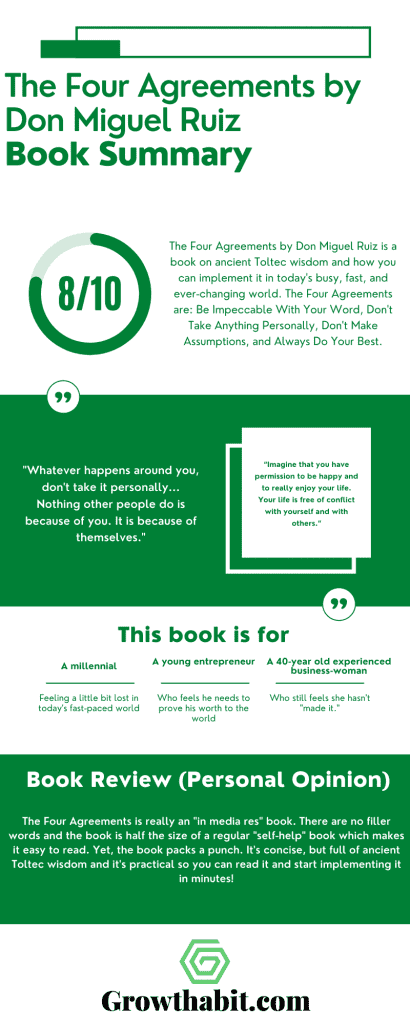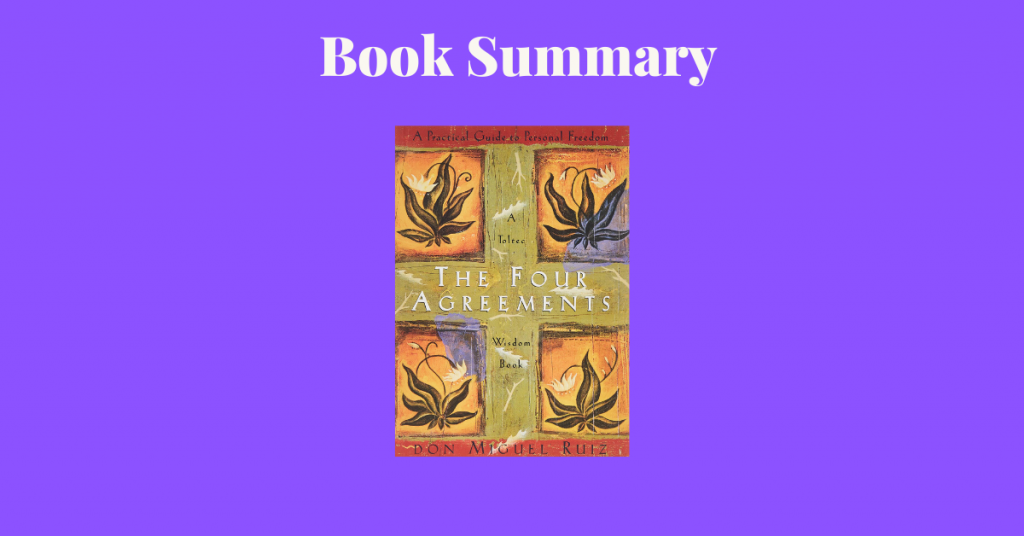The Four Agreements by Don Miguel Ruiz is a book on ancient Toltec wisdom and how you can implement it in today’s busy, fast, and ever-changing world.
The Four Agreements are: Be Impeccable With Your Word, Don’t Take Anything Personally, Don’t Make Assumptions, and Always Do Your Best.
Book Title: The Four Agreements: A Practical Guide to Personal Freedom (A Toltec Wisdom Book)
Author: Don Miguel Ruiz
Date of Reading: February 2017
Rating: 8/10
What Is Being Said In Detail:
The Four Agreements is quite a short but impactful book. The book has six chapters:
- THE FIRST AGREEMENT – Be Impeccable with Your Word. This is where Ruiz talks about you being honest with your word and having integrity. It’s like the Socratic triple filter test: Don’t speak if the thing you will say isn’t true, isn’t good, and isn’t useful.
- THE SECOND AGREEMENT – Don’t Take Anything Personally. Most of the things we experience in the world aren’t specifically directed toward us.
It’s like most of us are collateral victims of things that happen in the world and we should take it as that. If someone starts screaming at you, it’s probably them venting their frustrations and you just happen to be there.
- THE THIRD AGREEMENT – Don’t Make Assumptions. When you assume, you make an Ass of U and Me. So instead of assuming things, ask questions and don’t judge things as you think they are. Judge them as they are.
- THE FOURTH AGREEMENT – Always Do Your Best. You can’t be the real authentic you if you don’t always do your best. Ruiz emphasizes this point along with self-acceptance. It’s about accepting who you are, but still working your ass off every day to live an authentic life.
- The Toltec Path To Freedom. This chapter talks about three masteries that lead people to become Toltecs: matery of awereness, transformation, and intent.
- The New Dream. And the last chapter in The Four Agreements talks about the life you will lead once you implement the four agreements laid out in the book.
Most Important Keywords, Sentences, Quotes:
Introduction
“The domestication is so strong that at a certain point in our lives we no longer need anyone to domesticate us.
We don’t need Mom or Dad, the school or the church to domesticate us. We are so well trained that we are our own domesticator. We are an undomesticated animal.
We can now domesticate ourselves according to the same belief system we were given, and using the same system of punishment and reward.
We punish ourselves when we don’t follow the rules according to our belief system; we reward ourselves when we are the “good boy” or “good girl.”
“Not being perfect, we reject ourselves. And the level of self-rejection depends upon how effective the adults were in breaking our integrity.
After domestication it is no longer about being good enough for anybody else. We are not good enough for ourselves because we don’t fit with our own image of perfection.
We cannot forgive ourselves for not being what we wish to be, or rather what we believe we should be.
We cannot forgive ourselves for not being perfect. We know we are not what we believe we are supposed to be and so we feel false, frustrated, and dishonest.
We try to hide ourselves, and we pretend to be what we are not. The result is that we feel unauthentic and wear social masks to keep others from noticing this.
We are so afraid that somebody else will notice that we are not what we pretend to be. We judge others according to our image of perfection as well, and naturally they fall short of our expectations.”
“In your whole life nobody has ever abused you more than you have abused yourself. And the limit of your self-abuse is exactly the limit that you will tolerate from someone else.
If someone abuses you a little more than you abuse yourself, you will probably walk away from that person. But if someone abuses you a little less than you abuse yourself, you will probably stay in the relationship and tolerate it endlessly.
If you abuse yourself very badly, you can even tolerate someone who beats you up, humiliates you, and treats you like dirt. Why?
Because in your belief system you say, “I deserve it. This person is doing me a favor by being with me. I’m not worthy of love and respect. I’m not good enough.”
THE FIRST AGREEMENT – Be Impeccable with Your Word
“Consider how many times you have gossiped about the person you love the most to gain the support of others for your point of view.
How many times have you hooked other people’s attention, and spread poison about your loved one in order to make your opinion right? Your opinion is nothing but your point of view.
It is not necessarily true. Your opinion comes from your beliefs, your own ego, and your own dream. We create all this poison and spread it to others just so we can feel right about our own point of view.”
THE SECOND AGREEMENT – Don’t Take Anything Personally
“You eat all their emotional garbage, and now it becomes your garbage. But if you do not take it personally, you are immune in the middle of hell. Immunity to poison in the middle of hell is the gift of this agreement.
When you take things personally, then you feel offended, and your reaction is to defend your beliefs and create conflicts. You make something big out of something so little, because you have the need to be right and make everybody else wrong.
You also try hard to be right by giving them your own opinions. In the same way, whatever you feel and do is just a projection of your own personal dream, a reflection of your own agreements.
What you say, what you do, and the opinions you have are according to the agreements you have made — and these opinions have nothing to do with me.”
“Wherever you go you will find people lying to you, and as your awareness grows, you will notice that you also lie to yourself.
Do not expect people to tell you the truth because they also lie to themselves.
You have to trust yourself and choose to believe or not to believe what someone says to you.”
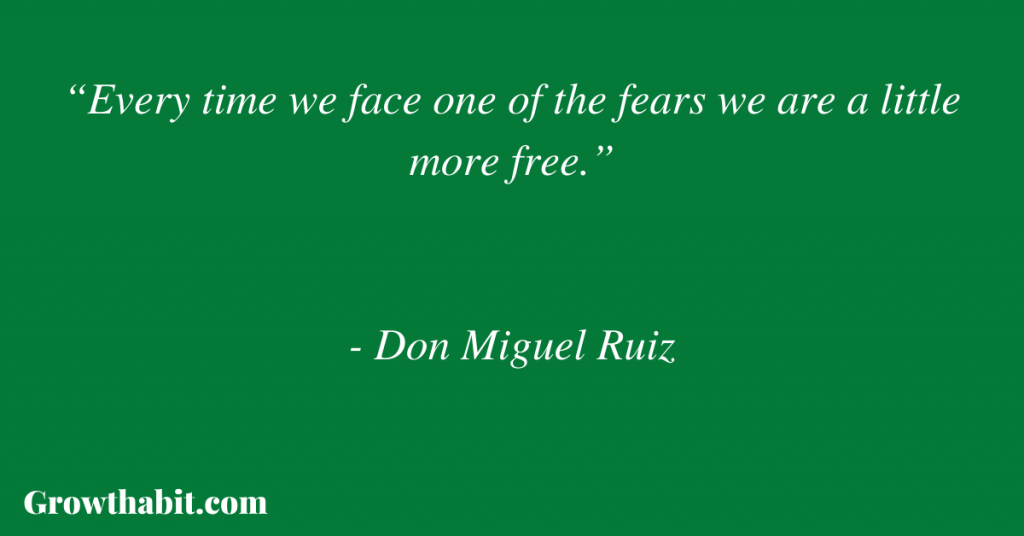
“If someone is not treating you with love and respect, it is a gift if they walk away from you.
If that person doesn’t walk away, you will surely endure many years of suffering with him or her. Walking away may hurt for a while, but your heart will eventually heal.
Then you can choose what you really want. You will find that you don’t need to trust others as much as you need to trust yourself to make the right choices.”
“You will only need to trust yourself to make responsible choices. You are never responsible for the actions of others; you are only responsible for you.
When you truly understand this, and refuse to take things personally, you can hardly be hurt by the careless comments or actions of others.”
THE THIRD AGREEMENT – Don’t Make Assumptions
“It is always better to ask questions than to make an assumption, because assumptions set us up for suffering.”
“We have the need to justify everything, to explain and understand everything, in order to feel safe.
We have millions of questions that need answers because there are so many things that the reasoning mind cannot explain.
It is not important if the answer is correct; just the answer itself makes us feel safe. This is why we make assumptions.”
“We have to be what we are, so we don’t have to present a false image. If you love me the way I am, “Okay, take me.”
If you don’t love me the way I am, “Okay, bye-bye. Find someone else.” It may sound harsh, but this kind of communication means the personal agreements we make with others are clear and impeccable.”
THE FOURTH AGREEMENT – Always Do Your Best
“Just do your best — in any circumstance in your life. It doesn’t matter if you are sick or tired, if you always do your best there is no way you can judge yourself.
And if you don’t judge yourself there is no way you are going to suffer from guilt, blame, and self-punishment.
By always doing your best, you will break a big spell that you have been under.”
“But it is the action that is going to make you feel intensely happy. When you always do your best, you take action.
Doing your best is taking the action because you love it, not because you’re expecting a reward.
Most people do exactly the opposite: They only take action when they expect a reward, and they don’t enjoy the action. And that’s the reason why they don’t do their best.”
“Doing your best really doesn’t feel like work because you enjoy whatever you are doing.
You know you’re doing your best when you are enjoying the action or doing it in a way that will not have negative repercussions for you.
You do your best because you want to do it, not because you have to do it, not because you are trying to please the Judge, and not because you are trying to please other people.”
“If you take action because you have to, then there is no way you are going to do your best. Then it is better not to do it.
No, you do your best because doing your best all the time makes you so happy. When you are doing your best just for the pleasure of doing it, you are taking action because you enjoy the action.”
“You can only be you when you do your best. When you don’t do your best you are denying yourself the right to be you.
That’s a seed that you should really nurture in your mind. You don’t need knowledge or great philosophical concepts. You don’t need the acceptance of others.
You express your own divinity by being alive and by loving yourself and others. It is an expression of God to say, “Hey, I love you.”
The Toltec Path To Freedom
“This chain of training from human to human, from generation to generation, is perfectly normal in human society.
You don’t need to blame your parents for teaching you to be like them. What else could they teach you but what they know?
They did the best they could, and if they abused you, it was due to their own domestication, their own fears, their own beliefs.
They had no control over the programming they received, so they couldn’t have behaved any differently.”
“The real you is still a little child who never grew up.
Sometimes that little child comes out when you are having fun or playing, when you feel happy, when you are painting, writing poetry, or playing the piano, or expressing yourself in some way.
These are the happiest moments of your life — when the real you comes out, when you don’t care about the past and you don’t worry about the future. You are childlike.”
“There are three masteries that lead people to become Toltecs. First is the Mastery of Awareness.
This is to be aware of who we really are, with all the possibilities. The second is the Mastery of Transformation — how to change, how to be free of domestication.
The third is the Mastery of Intent. Intent from the Toltec point of view is that part of life that makes transformation of energy possible; it is the one living being that seamlessly encompasses all energy, or what we call “God.”
Intent is life itself; it is unconditional love. The Mastery of Intent is therefore the Mastery of Love.”
“Every time we face one of the fears we are a little more free.”
“The way you see the world will depend upon the emotions you are feeling. When you are angry, everything around you is wrong, nothing is right.
You blame everything including the weather; whether it’s raining or the sun is shining, nothing pleases you.
When you are sad, everything around you is sad and makes you cry. You see the trees and you feel sad; you see the rain and everything looks so sad.
Perhaps you feel vulnerable and have a need to protect yourself because you don’t know in what moment someone will attack you. You do not trust anything or anyone around you.
This is because you see the world with the eyes of fear!”
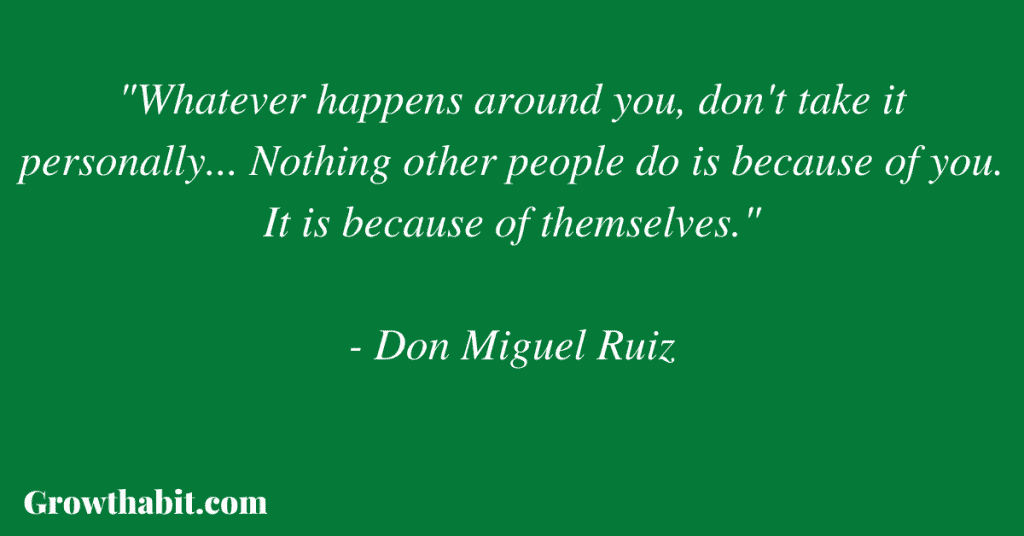
“First, we need to forgive our parents, our brothers, our sisters, our friends, and God.
Once you forgive God, you can finally forgive yourself. Once you forgive yourself, the self rejection in your mind is over.
Self-acceptance begins, and the self-love will grow so strong that you will finally accept yourself just the way you are. That’s the beginning of the free human. Forgiveness is the key.”
“The warrior has control. Not control over another human, but control over one’s own emotions, control over one’s own self. It is when we lose control that we repress the emotions, not when we are in control.
The big difference between a warrior and a victim is that the victim represses, and the warrior refrains.
Victims repress because they are afraid to show the emotions, afraid to say what they want to say. To refrain is not the same thing as repression.
To refrain is to hold the emotions and to express them in the right moment, not before, not later.
That is why warriors are impeccable. They have complete control over their own emotions and therefore over their own behavior.”
“When we live in the dream of the planet, it is as if we are dead. Whoever survives the initiation of the dead receives the most wonderful gift: the resurrection.
To receive the resurrection is to arise from the dead, to be alive, to be ourselves again. The resurrection is to be like a child — to be wild and free, but with a difference.
The difference is that we have freedom with wisdom instead of innocence.”
The New Dream
“Imagine that you have permission to be happy and to really enjoy your life. Your life is free of conflict with yourself and with others.”
“Imagine living your life without judging others. You can easily forgive others and let go of any judgments that you have.
You don’t have the need to be right, and you don’t need to make anyone else wrong. You respect yourself and everyone else, and they respect you in return.”
“The world is very beautiful and very wonderful. Life can be very easy when love is your way of life. You can be loving all the time.
This is your choice. You may not have a reason to love, but you can love because to love makes you so happy.
Love in action only produces happiness. Love will give you inner peace. It will change your perception of everything.”
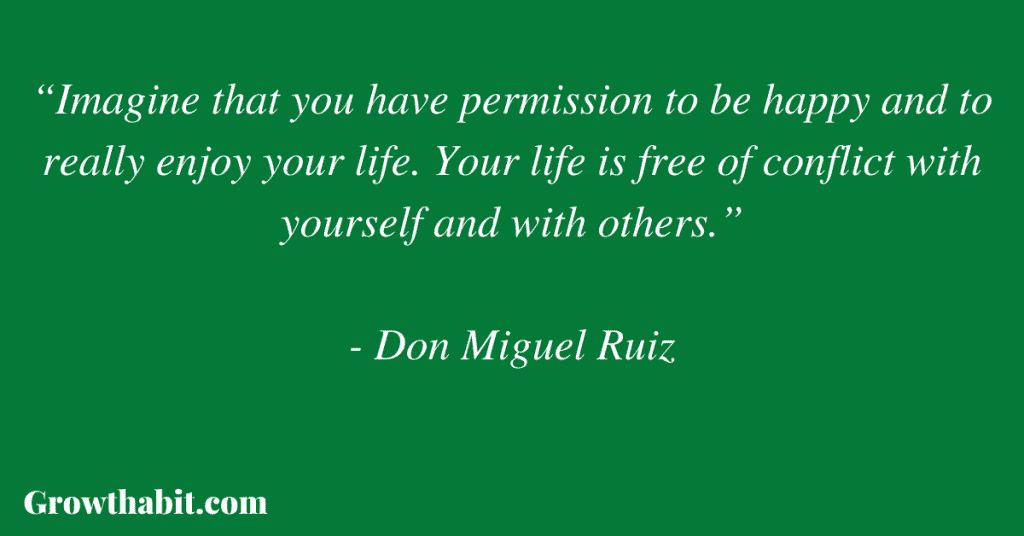
“The old man begins to tell you his story: “My teacher opened his chest and took out his heart, and he took a beautiful flame from his heart.
Then he opened my chest, opened my heart, and he put that little flame inside it.
He put my heart back in my chest, and as soon as my heart was inside me, I felt intense love, because the flame he put in my heart was his own love.
“That flame grew in my heart and became a big, big fire — a fire that doesn’t burn, but purifies everything that it touches. And that fire touched each one of the cells of my body, and the cells of my body loved me back.
I became one with my body, but my love grew even more.
That fire touched every emotion of my mind, and all the emotions transformed into a strong and intense love. And I loved myself, completely and unconditionally.”
Book Review (Personal Opinion):
The Four Agreements is really an “in media res” book. There are no filler words and the book is half the size of a regular “self-help” book which makes it easy to read.
Yet, the book packs a punch. It’s concise, but full of ancient Toltec wisdom and it’s practical so you can read it and start implementing it in minutes!
Rating: 8/10
This Book Is For (Recommend):
- A millennial feeling a little bit lost in today’s fast-paced world.
- A young entreprenur who feels he needs to prove his worth to the world.
- A 40-year old experienced business-woman who still feels she hasn’t “made it.”
If You Want To Learn More
Here’s Don Miguel Ruiz talking with Oprah on her podcast.
Oprah’s SuperSoul Conversations
How I’ve Implemented The Ideas From The Book
It took me a lot of time to uncover true self-acceptance, especially since I was quite different from the people in my environment. I grew up in a war-torn country where most people struggled (and still do) to make ends meet and where people were quite rough.
Emotional (and physical) violence was a daily occurence and it took me years and years to deal with my limiting beliefs and faulty conditioning.
One Small Actionable Step You Can Do
The entire book is created as a small actionable step so instead of one, I will give you four small steps that you can do every day:
- Be Impeccable With Your Word
- Don’t Take Anything Personally
- Don’t Make Assumptions
- Always Do Your Best
